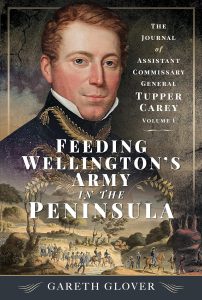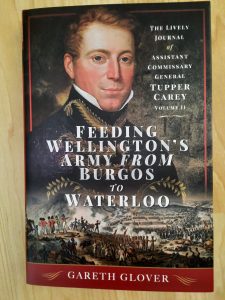Feeding Wellington’s Army – The Memoirs of Commissary Tupper Carey Volume 1 & 2
Published by Pen & Sword November 2023 & June 2024


The rest of Tupper’s incredible career is now covered in the second volume which covers the War up until Toulouse in 1814 and the Waterloo campaign and subsequent Army of Occupation till 1818
Some of the finest memoirs written from the Peninsular War (1808-14) have actually emanated from one of the civilian branches, the Commissariat Department. For those already cognisant with at least some of these memoirs, one is immediately drawn to the astonishing account of that inveterate womaniser August Schaumann[1], the travelogue of William Graham[2], or the more prosaic memoirs of John Daniel[3] and Richard Henegan[4], but these memoirs often fail to fully explain the role they performed in much detail or how they achieved it in such a hostile environment.
Commissary General Tupper Carey may also be known by some for his short but interesting and very honest account of his service during the Waterloo campaign with General Sir Henry Clinton’s Second Division[5], but unfortunately that is all we have had of his memoirs. To be strictly accurate, that is not true, because the early part of his Peninsular War Recollections was published in an obscure magazine in a small series of articles[6], but they never even reached as far as the Battle of Talavera in 1809 before they stopped, hinting perhaps that the rest was already lost forever.
Then, a few years ago, I received an email from Dr Juliet Carey, a direct descendant, stating that the family had the entire memoirs of Tupper Carey and wanted someone to publish them in their entirety – I need hardly say that I jumped at the chance.
Tupper’s memoirs are contained in four large, tightly hand-written journals, covering from his first moment as a junior office clerk, through to the end of the Army of Occupation when he was arguably the most important Commissary then working for the Duke of Wellington. The manuscript unfortunately does not cover his later career in the West Indies and eventually Malta, but what it does contain is a vast amount of detail on the role he carried out, giving us a truly unique window into the life of a Commissary, thankfully without ever over-doing the sheer drudgery of the role at times. However, although a civilian and greatly discouraged from putting himself in mortal danger, Tupper was often to be found watching the fighting from some nearby (and hopefully safe vantage point) and often describes the actions he witnessed, particularly where it affected his own charge, whether a battalion, a brigade or even later an entire division. Interspersed with these primary roles, he was often seconded to form supply bases in the rear of the army, or to hastily remove or destroy stores when threatened by enemy advances. He also talks freely about fellow officers, and being a private journal written simply for the eyes of his immediate family, he is not shy in giving his honest opinions of both his subordinates or indeed his superiors.
Indeed his memoirs are so voluminous (nearly 180,000 words), that they have had to be published in two volumes. This the first volume, covers his early life, joining as a clerk and his early years as a Commissary up until the spring of 1813, just before the Duke of Wellington launched his troops on that memorable campaign, designed to drive the French back out of Spain, across the Pyrenees.
Tupper was born on the 16 April 1788 and was baptised on 25 April 1788 at the Town Church[7]. He was apparently sent away to school – all efforts have failed to discover where – and in 1804 he returned home at the age of sixteen and was immediately put to work as a clerk and so started his career in the Commissariat.
So let us look at where he served, in what capacity and what major events this volume covers within the very varied career of Tupper Carey in his own words, taken from his statement written in Malta in the early 1840’s.
Services of Commissary General Tupper Carey officially called for by the Lords Commissioners of Her Majesty’s Treasury while at the head of the Commissariat Department in the Island of Malta and dependencies
He entered the Commissariat at the age of 16 at Guernsey in December 1804 as clerk to the Assistant Commissary General Rawlings, during whose continued and protracted absences in England in 1807 until August 1808 [he] carried on in great measure, the duty of that island and was entrusted with the custody of the public money in Bank of England notes, often times to the amount of £1,000 and upwards, intended to operate the reduction of the existing discount on public bills.
He left that station for more active service and on the recommendation of Lieutenant General Sir J Doyle, under whom he had been serving, was immediately afterwards appointed by Commissary in Chief Erskine, to the army of Sir David Baird, proceeding in September 1808 to the Peninsula. On landing at Corunna, [he] remained some time at Deputy Commissary General Cooper’s office and was sent in November to form a department at Orense [Ourense] on the frontiers of Galicia, intended for the supply of the two armies in effecting their junction; which depot, on the retreat of Sir John Moore, was distributed to the Marquis of Romana’s army and to the Light Division of the British Army retiring to Vigo, afterwards was attached as Commissariat Officer to the rear guard and embarked with them for England.
Continued in Mr Erskine’s office [at] Whitehall until he re-embarked for Portugal in April 1809 and then had the Commissariat charge of two brigades [of artillery] and [the] reserve artillery during the operations of the passage of the Douro, Battle of Talavera and subsequent retreat.
Was employed at Elvas, in the Superintendent of Transport [Office] attached to the extensive General Hospital at [the] depot there; afterwards in Commissary General Murray’s office at Badajoz, for some months and returned to the Reserve of Artillery, at the express request of Major General Sir W [E] Howorth who commanded the artillery in its march to the north of Portugal in December 1809 and [he] was then made [an] Acting Assistant Commissary General.
In January 1810 [was given] the additional Commissariat charge of the extensive depot of Coimbra; in July that of Pinhanços at the time of movement of the army near the frontier, while the French were besieging Ciudad Rodrigo and Almeida. [He] broke it up upon the approach of the enemy, subsequently in September established that of Espinhal and for the same reason abandoned it. Was actively employed in the retirement to the Lines of Torres Vedras near Lisbon, in removing stores from several points on the line of movement and on the Tagus, to avoid their falling into the hands of the enemy. Immediately after joined Sir William Erskine’s Brigade of infantry [in the 1st Division] in the Lines of Torres Vedras and remained with it until March 1811.
Went ill to Lisbon from fatigue and was then employed in the Deputy Commissary General Vaux’s office examining accounts until July, when he rejoined the army at Portalegre and took charge of the depot of Castelo Branco in August and was confirmed Assistant Commissary General on the 10th of that month.
In November [1811, he] was transferred to the 3rd Regiment of Heavy Dragoons as Senior Commissariat Officer of the brigade of cavalry under the command of the late Major General Le Marchant, with which he continued during the sieges of Ciudad Rodrigo, Badajoz, Battle of Salamanca, entrance into Madrid and siege of Burgos until the retreat from there in November 1812. From thence in November 1812, he joined the [4th] Division of infantry under Lieutenant General Sir Lowry Cole, as Senior Superintending Commissariat Officer with which he continued during the many arduous campaigns of the years 1813.
The dates of his seniority are:
Acting Assistant Commissary General December 1809
Deputy Assistant Commissary General 23 May 1810
Assistant Commissary General 10 August 1811
